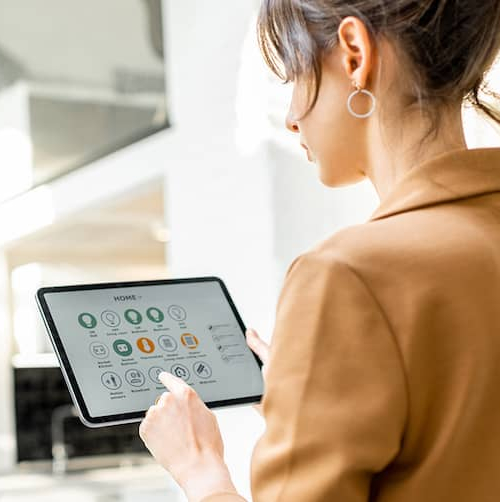Smart home: Definition, benefits, and the best smart home devices
Contributed by Tom McLean
Oct 31, 2025
•7-minute read

Smart home devices are popular. According to a 2025 report by Horowitz Research, 48% of American homes have at least one smart home device. Top devices include smart TVs, home security cameras, and sound systems. Smart devices in a home can enhance safety, make life more convenient, and, according to one estimate, increase your property's value by 3% – 5%.
What is a smart house?
A smart home is equipped with internet-connected devices and appliances that can be monitored and controlled remotely, typically through a smartphone or similar device. For example, smart devices can allow you to open your garage door, monitor your doorbell, and adjust your thermostat from your phone.
How do smart homes work?
Smart homes connect internet-enabled devices and appliances to a network. Each can be controlled from a device like a tablet, smartphone, or smartwatch.
You also can automate smart devices to follow specific schedules or react to sensor data. For example, you can program a smart thermostat to lower the temperature at night or set smart lights to turn on only when their motion sensors detect movement.
The basic components of any smart home network include the following:
- Smart device. A smart device is an appliance or device that connects to your home network and can be controlled through an app.
- Smart hub. This is the brain of the operation, where everything is controlled. It provides a central place to receive and route commands to your devices. It's often a device, such as a smart speaker or a small puck-like device you attach to your internet router.
- Control application. This is the app on your smart hub device that controls your devices and allows you to access them.
Common smart home features
Here are some of the most common smart home devices out there:
Smart lighting
Smart lighting can refer to smart bulbs, plugs, or in-wall switches:
- Smart bulbs are installed on existing light fixtures, allowing you to control light levels by providing direct control over the light bulb. Expect to spend $11 – $30.
- Smart plugs sit between an outlet and a lamp plug, letting you control the lamp's light by controlling the electrical flow. Expect to spend $10 – $30.
- Smart in-wall switches enable you to activate, deactivate, and dim lights from a single switch or via a smartphone app. Expect to spend $19 – $50.
With any of these smart light options, you may never need to enter a dark room again or get out of bed to turn off the light at night. Instead, you can tap a button on your phone's screen or give a voice command. You can even have smart lights follow a schedule via automations.
While installing smart lights may incur some up-front costs, such as hiring a professional electrician, they're unlikely to increase your electricity bill. In fact, they may even lower it by helping you use your lights more efficiently and automatically turning off when you're not around.
Smart thermostats
Another way to make your home more energy-efficient is by installing a smart thermostat. It can program itself based on your household habits to ensure you aren't using your HVAC system unnecessarily. For example, it can lower the heat during slumber hours and raise it when nobody is home during summer months. That way, you conserve more energy. You can expect to pay $60 – $250.
Plus, you can manually set a smart thermostat from your phone or through a voice command.
Keep in mind that installing a smart thermostat is comparable to changing a light fixture, so you may need to hire a professional, depending on your handyman skills.
Smart speakers and digital assistants
A smart speaker, often paired with a digital assistant, is a speaker with built-in microphones that recognize and respond to spoken commands. With a simple request, you can play music, set timers, check the weather, or control other smart home devices.
Smart speakers can be a great addition to your home, especially if you're an audiophile. They let you play music on demand, adjust the volume, and switch playlists using only your voice or phone. Some models even feature touchscreen displays for added functionality. Expect to pay anywhere from $50 to $400.
Smart home appliances
As the name suggests, smart home appliances are internet-enabled devices that are used in the home. Some of the most popular appliances include smart refrigerators, ovens, dishwashers, and coffee makers. However, there are many more. Here's a list of smart home appliances to consider:
- Smart refrigerators can track expiration dates, suggest recipes, and help you create grocery lists. Although more expensive than a regular fridge, they can be more convenient and cost-efficient in the long term by helping you avoid wasting or overspending on food.
- Smart ovens can be programmed to be timed, preheated, and monitored remotely. They're great for anyone who likes to cook but doesn't want to be tied down to the kitchen.
- Smart dishwashers can alert you when detergent is low or a cycle is complete. They can also optimize water and energy usage based on the dish load. As a result, the upfront investment may be worthwhile considering the long-term utility savings.
- Smart coffee makers let you schedule brewing and start a pot remotely. They're also relatively low-cost, making them an easy addition for coffee lovers.
- Smart sprinkler systems use weather data and soil sensors to optimize watering schedules. This helps you conserve water, reduce utility bills, and keep your lawn and garden healthy with minimal effort.
- Smart robot vacuums can clean your floors independently. With a bit of upfront setup and occasional maintenance, they can be a significant timesaver.
- Smart robot lawn mowers are like robot vacuums. They handle grass mowing for you on a schedule, all but eliminating the manual effort you must dedicate to lawncare.
- Water leak sensors detect leaks early, alerting you before minor issues become costly floods. The upfront investment is small, but the potential savings could be massive.
- Smart water shut-off valves go a step further than leak sensors, automatically shutting off the water supply if a leak is detected. Though more expensive, they offer even more protection from costly damage.
- Smart hose timers allow you to schedule watering cycles via an app, ensuring your plants are watered consistently without waste. They're a relatively inexpensive entry into smart irrigation.
- Smart fans can be remotely operated, scheduled, and even automatically adjusted based on temperature and occupancy. Though not as critical as HVAC systems, they offer comfort and energy savings for minimal upfront effort.
- Smart shades and blinds can be scheduled to open with the sunrise or close during peak heat hours, saving on cooling costs and improving home security. Installation requirements vary but can be well worth the convenience and energy efficiency.
Smart home security systems
Smart home security systems are among buyers’ most-wanted features. They include smart door cameras, door locks, or other devices to monitor your home around the clock and receive instant alerts if something appears suspicious. For example, some smart home detectors can detect body heat and motion and even distinguish between humans and animals.
Most smart home security systems are simple to install, disassemble, and reassemble. However, you may need to hire a professional to help. These systems come in both wired and wireless varieties and often require a monthly monitoring fee.
Smart plugs and outlets
Smart plugs and outlets let you remotely control the electrical flow of whatever's plugged into them. For example, when you place a smart plug in between an outlet and a connected device, you can save energy by having the electrical flow follow a schedule. Most smart plugs are rated for 15 amps of current, making them suitable for use with low-power devices, such as lamps.
Alternatively, you can install in-wall smart outlets as a more permanent solution. They typically cost $25 – $50. To install one, you need the right tools, skills, and access to the circuit breaker. Otherwise, hire an electrician.
Benefits of smart home devices
Here are the top benefits of investing in smart home devices:
- Higher home value: Installing smart devices can increase your home value. According to data from the National Association of REALTORS®, smart homes are often worth more than comparable homes without smart devices. Plus, buyers are willing to pay more for smart homes, even if other areas of the home are outdated.
- Convenience: By being informed about your home's activities and being able to control many devices, you can save time and effort.
- Safety: Smart home devices, such as smart locks or garage door openers, give you added security. They can eliminate shared garage codes or the need to give out keys to your home. They can also alert you when a stranger is at the door, a break-in occurs, or a porch theft is in progress. In short, they can give you peace of mind.
- Cost savings: Installing energy-efficient smart devices can lower your utility bill. For example, a thermostat programmed to shut down automatically to conserve energy can significantly decrease your utility bills.
FAQ
Here are answers to common questions about smart homes.
Are smart homes energy-efficient?
Yes, many smart home devices are energy-efficient because they optimize utility usage based on weather and occupancy. According to one study, smart appliances can reduce your energy usage by up to 25%. That's in addition to any energy savings from using solar panels or green architecture.
How much do smart homes cost overall?
The cost of a smart home varies widely depending on the devices, brands, and level of integration you choose. According to HomeAdvisor, the average cost of converting a home into a smart home is $875, but you'll likely spend anywhere from $200 to $1,650.
Keep in mind that high-end, fully integrated systems often require renovations and remodeling, which can be expensive. Home remodeling costs can go as high as $100,000 or more, depending on the size of the home and the complexity of the system. However, individual devices start at under $100.
Rocket Mortgage® provides a free Home Renovation Cost Estimator Spreadsheet to help you estimate your smart home costs.
The bottom line: Smart devices can enhance your home's comfort, security, and peace of mind
Smart home technology can enhance comfort, improve safety, increase energy efficiency, and even increase your home's value. But it's important to weigh the costs and logistics before investing.
Your total upfront expense will depend on the number and types of smart devices you choose to install, from affordable thermostats to full appliances or system upgrades. Be mindful of compatibility between devices and have a backup plan for internet outages that could disrupt your smart home system.
If you're considering a larger upgrade, remember that financing options like home equity loans or lines of credit can help you achieve your smart home goals sooner. Apply for a loan from Rocket Mortgage today to explore your options!

Christian Allred
Christian Allred is a freelance writer whose work focuses on homeownership and real estate investing. Besides Rocket Mortgage, he’s written for brands like PropStream, CRE Daily, Propmodo, PropertyOnion, AIM Group, Vista Point Advisors, and more.
Related resources
9-minute read
Starter home or forever home: Which is right for you?
A starter home is a small, affordable home for first-time buyers. Find out if it makes sense to buy a starter home or if a forever home is right for you.
Read more
5-minute read
How to increase your house value
Upgrading parts of your home is a great way to increase its value. Here are 9 tips about how to get started and finance your renovation projects.
Read more

8-minute read
How much does it cost to renovate a house?
The amount it costs to remodel a house can vary depending on the scale of the project. Learn the average costs associated with various kinds of remodels.
Read more